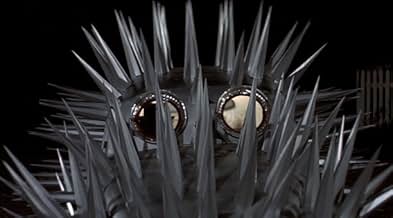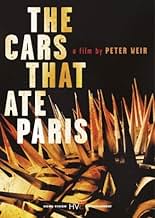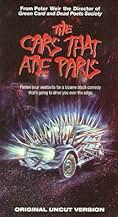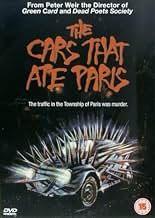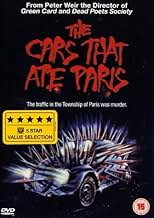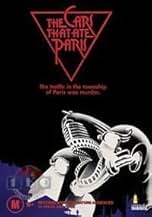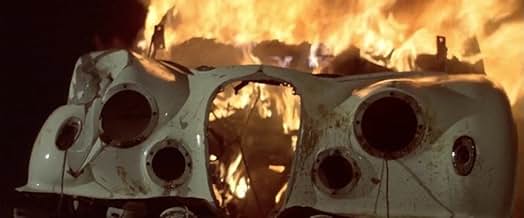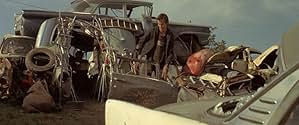The small town of Paris, Australia deliberately causes car accidents, then sells/salvages all valuables from the wrecks as a means of economy.The small town of Paris, Australia deliberately causes car accidents, then sells/salvages all valuables from the wrecks as a means of economy.The small town of Paris, Australia deliberately causes car accidents, then sells/salvages all valuables from the wrecks as a means of economy.
- Awards
- 1 win & 1 nomination total
- Man in House
- (as Herbie Nelson)
- Clive Smedley
- (uncredited)
Featured reviews
There also seems to be a lot of misunderstanding about the nature of the film. Basically, The Cars That Ate Paris is a quirky art-house drama. Yes, it has elements of (macabre) humor, horror and many other genres, but those are not a focus. The Cars That Ate Paris is as much a western as it is a horror film, which is not to say that it doesn't have elements of the western genre--it does. But the tone is much more similar to, say, Bagdad Café (aka Out of Rosenheim, 1987) or Delicatessen (1991) (hmmm--notice the culinary metaphor motif). If you want to think of The Cars That Ate Paris as a horror film--and it is basically a surrealist nightmare--think of it as something like Maximum Overdrive (1986)/Trucks ((1997) meets Horror Hotel (aka City of the Dead, 1960), but made by David Lynch as a "realist" soap opera.
So what is the film about more literally? Well, it's best perhaps if you know as little about it before as possible, but on the other hand, it's a bit cryptic, and Peter Weir isn't exactly forthcoming with explanatory exposition--the film remains very open to interpretation to the end--so maybe a vague description won't hurt. The Paris of the title is not in France. It's instead a small, bucolic village in rural Australia. The town has quite a few "dirty secrets". The two primary secrets have to do with an automobile (part) obsession and a program of human experimentation. For the most part, they try to keep people out of the town, which has a very small population, but their twisted fetishes necessitate the occasional admission of outsiders, though in an unusual, involuntary manner. The film is centered on the story of one particular outsider, Arthur Waldo (Terry Camilleri), who manages to enter Paris relatively unscathed and who for unspecified reasons is worked into the fabric of the town. Arthur's arrival and integration roughly corresponds to a growing cleavage between generations, or at least between the status quo and a rebellious group of younger men, and he unwittingly serves as a catalyst to what amounts to a civil war.
Although in Peter Weir's video interview included on the DVD he refers to Arthur as an unsympathetic protagonist, I beg to differ. Camilleri plays Arthur as an enigmatically captivating simpleton--the most entrancing "blank" personality this side of Peter Sellers' Chauncey Gardiner in Being There (1979). For most of the film, Weir shuttles Arthur around like a pawn, enabling a metaphorical window through which to satirically examine small town (Australian) life. In this respect, The Cars That Ate Paris somewhat resembles the basic gist of Lars von Trier's Dogville (2003), except that unlike Dogville, The Cars That Ate Paris is a good film.
It's particularly funny how Arthur is shuttled into a variety of jobs, which he is assumed qualified for by a mere change of clothing (and very minor changes at that) and title. He's a doctor one moment, a parking enforcer the next. Weir works in satirical jabs towards everything from appealing to noble grand narratives about pioneer forefathers to the discrepancy between religious, private and political life, the myth of the well-adjusted nuclear family, the charade of public ceremonies, and even partakes in a slight Lord of the Flies-styled commentary on "progress".
But not everything is social critique. Weir is just as concerned with (and just as good at) imbibing in quirkiness for its own sake (although even that stuff we could read as a critique on social conventions if we wanted to) and see-sawing between a kind of community existentialist nightmare and an Our Town-like small village drama. And just in case that's too balanced, every so often he puts us in the middle of a spaghetti western, with the beginnings of mid-street showdowns. Much of the rebellious youth material can be interpreted as a western with hodge-podge automobiles, which is probably why those youths are the ones to don clothing that looks as if Weir borrowed it from the set of A Fistful of Dollars (aka Per un pugno di dollari, 1964).
The music is similarly disparate, ranging from techno-psychedelia that's something like Pink Floyd's "Time" to pensive contemporary-sounding themes, or the hilariously amateurish performance at the Paris Ball.
This is definitely not a film for all tastes. If you wouldn't typically like art-house films, you probably won't appreciate The Cars That Ate Paris, either, and even if you do typically like art-house films, you probably won't appreciate The Cars That Ate Paris unless you have a strong taste for the bizarre and macabre.
Don't watch it if you think low budget is the same as being 'amateurish' because it's not. And if you're not used to Australian English, well, try not to panic. Doesn't matter if you don't get every word - just go with it!
This is the kind of film you don't see much any more, perhaps a product of its era. They weren't thinking much about marketing or target demographics - these filmmakers were just having a lot of fun, experimenting and coming up with something unique. Genre crossing, challenging and freaky, it also taps into some big themes about Australian identity and paranoia.
Now time-out here...let's just back it up a bit! Peter Weir is not what you would term a prolific director. He has made just 15 features in exactly 30 years - he doesn't rush things! This was his second turn in the chair. He had at his disposal a budget not much more than that for a 60 second TV Commercial and he was under pressure to finish the flick in time for its premiere at the Cannes Film Festival that year. He did OK and in a master stroke of marketing, managed to get the "star" of the movie - the spiked beetle, on to the Cannes streets where it caused a media sensation. The film was very well received by an appreciative audience.
So, the story is far-fetched? Some of the residents of tiny bush-town Paris deliberately cause auto-wrecks to boost the town's economy. Sure its a way left-field storyline and the acting was never going to win an Oscar nomination. It has though, that indefinable "something" and is early Peter Weir - a study of people in crisis or near crisis? It deserves to be seen for what it is, and the manner in which it shaped Peter Weir's future. THE CARS THAT ATE PARIS was in effect a springboard that gave Weir the opportunity to make PICNIC AT HANGING ROCK the following year. If "Paris" had been a total flop he may never have been asked to direct it!
Watch it again and look for innovation, clever camera angles, smart direction...they're all there! This is relegated now to almost cult film-status in Australia, it is somewhat of a time-capsule!
The only question I have, is who changed the name of this film to THE CARS THAT ATE PEOPLE for US release? especially as they have their OWN "Paris"...in Texas!
,France for those who care.
Weir is full of savoir faire when it comes to create an atmosphere:"picnic at hanging rock" "Mosquito coast" the highly superior " fearless" would exist even if there was no plot at all.but plots they all have and first-class at that.
"The cars" begins quite well and the first half is a little treat:this town ,where everybody tries to help you ,this bunch of weirdos ,everything is much fun to watch.Their idee fixe to help the unfortunate hero is not unlike the neighbor's behavior in "Rosemary's baby" .The "test" is sheer shrink paraphernalia spoof and it superbly works.Even the past and the guilty feeling which come back to haunt poor Waldo verge on parody.
But the movie loses steam halfway through:it features scenes à la Leone (complete with morriconesque music)which come at the most awkward moment and destroy the inimitable atmosphere that Weir had built.
Despite these reservations,Weir's fans could do worse than watching this little film .Other good lines when the lad explains to moron Waldo: "well,this is the waiting room and these are people waiting!"
Did you know
- TriviaThe opening scenes that feature a couple driving in a car and smoking prominently displaying cigarettes were a parody of a commercial aired on Australian television at the time of the film's original release. Website 'Peterweircave' says of this: "The opening "advertisement", which many viewers seem to take as blatant product placement for Coke and Alpine cigarettes, was actually a spoof in itself. At the time it was made, movies in Australia were often preceded by ads for cigarettes and such. By putting this before the opening credits, Weir was fooling the viewers into thinking this was yet another ad."
- GoofsThe people thrown from the car in the first accident are obvious dummies.
- Quotes
The Mayor: Have you country boys forgotten the old school war cry? Have you forgotten the meaning of those words? Womerah, Womerah, babaluke, boomerang, crocodile, kookaburra, wombat, orang-outang. Wheeho, whayho, terramungamine, quondong, billabong, gundabluey pine. Platypus, emu, wallaby, 'roo, ibis, brolga, and white cockatoo. Murrumburrah, Cowra, Coolamon, Banco, Boggabri, Narromine, Nevertire, Yanco! Whoo-ra! Whoo-ra! Ha! Ha! Ha! Yanco High School, Yah! Yah! Yah!
- Alternate versionsUS version, titled _The Cars that Ate People (1974)_ was shortened to 74 minutes by the distributor, and star Terry Camilleri's voice is dubbed. The film was finally reissued in the USA at complete length in 1984.
- ConnectionsEdited into Terror Nullius (2018)
- SoundtracksRock of Ages
(uncredited)
Lyrics by Augustus Montague Toplady
Music by Thomas Hastings
Played at the church
- How long is The Cars That Ate Paris?Powered by Alexa
Details
Box office
- Budget
- A$250,000 (estimated)
- Gross worldwide
- $786
- Runtime1 hour 28 minutes
- Sound mix
- Aspect ratio
- 2.39 : 1
Contribute to this page


![Watch Trailer [OV]](https://m.media-amazon.com/images/M/MV5BYmRjNDU0MDItYTEwZS00NmM5LTkyNTEtMTg2MGU1ZGRiODQ4XkEyXkFqcGdeQXRyYW5zY29kZS13b3JrZmxvdw@@._V1_QL75_UX500_CR0)
